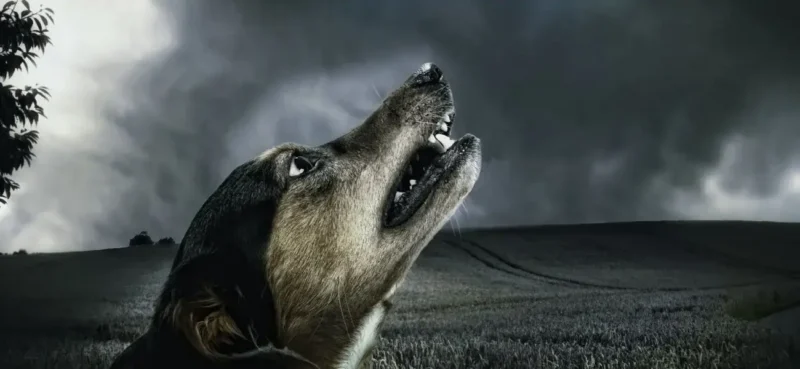Dogs are fascinating creatures, and if you’ve ever been jolted awake by your dog’s howling in the middle of the night, you know it can be a bit unsettling. But have you ever wondered why this happens? Just like an opera singer uses their diaphragm to project their voice, dogs use their own unique vocal techniques to communicate. The high-pitched howling is one of the many sounds dogs make to get attention or express their feelings. From barking to whining, each has its own pitch and intensity, often carrying different variations that reflect what they’re trying to say.
Dogs have an incredible ability to communicate with their body as well, using both sound and physical signals. This combination of vocal expression and body language is essential in their language.
WHY DO DOGS HOWL AT NIGHT?
Interestingly, howling is a natural behavior for dogs, much like a performance on a stage. It can be triggered by a variety of reasons, such as territorial instincts, loneliness, or even separation anxiety. Some dogs do it more frequently, while others only howl in certain situations. Dogs use howling to communicate with both humans and other dogs. Whether it’s the call of the wild or simply trying to reach out to their owner, howling has deep roots in their nature.
Puppies from certain breeds tend to howl more than others, while aging dogs may start howling due to medical issues or dietary problems. Paying close attention to when and why your dog howls can help solve the mystery behind this behavior.
COMMON DOG BREEDS THAT HOWL AT NIGHT
Many dog owners have noticed that some dogs tend to howl more than others, especially at night. This behavior is often instinctual and comes from their ancestors. Dogs use howling as a way to communicate with their pack members. There are several breeds that are known for their howling tendencies, and understanding these breeds can help owners address the reasons behind this behavior. Here are some common dog breeds that howl at night:
- Siberian Huskies: This chatty breed loves to howl and can often be heard communicating with their owners and other dogs.
- Beagles: Beagles can also be heavy howlers, especially when they are on the hunt or feel anxious.
- Coonhounds: Their howling serves as a means to warn others and keep their pack together.
- Yorkshire Terriers: Express their feelings through howling.
- German Shepherds: They howl to alert their owners of any potential threats.
- Basset Hounds: With their deep howling, Basset Hounds are known to express their emotions, whether it’s joy or distress.
- Chihuahuas: These little dogs can have a big voice and may howl when feeling lonely or seeking attention.
QUICK OVERVIEW
Each of these breeds may howl for different reasons, whether it’s to express distress, anxiety, or simply to communicate with their human parents. Let’s explore them:
| Cause of Howling | Description | Solutions |
|---|---|---|
| Medical Issues | Dogs may howl due to pain, injury, or illness. | Check for injuries, monitor eating habits, and visit a vet if necessary. |
| Hunger | Howling may indicate hunger or lack of proper nutrition. | Ensure balanced meals with appropriate nutrients. Adjust meal timings or portions if needed. |
| Separation Anxiety | Dogs may howl when feeling isolated or anxious after being left alone. | Use counterconditioning and desensitization to reduce anxiety. Increase socialization. |
| Seeking Attention | Dogs sometimes howl to get their owner's attention. | Ignore the howling to break the habit, use commands like “Quiet” and “Speak.” |
| Excess Energy | Dogs with too much energy at night may howl to release it. | Provide more daytime activities, exercise, or dog daycare to tire them out. |
| Responding to Other Dogs | Dogs may howl in response to other dogs howling nearby. | Use commands to teach quiet behavior. Use desensitization techniques if needed. |
| Responding to Noises | Loud or high-pitched noises (sirens, instruments) may trigger howling. | Desensitize the dog to specific sounds if the howling persists frequently. |
| Territorial Marking | Howling can indicate the dog is marking its territory. | Teach quiet behavior through commands or distractions. |
| Need for Urination | Dogs may howl if they need to go outside for a bathroom break. | Ensure they have access to go out before bed or have scheduled bathroom breaks. |
| Aging | Older dogs may howl due to discomfort, confusion, or anxiety related to aging. | Be mindful of their physical and mental health, and provide comfort or consult a vet. |
| Socialization Milestones | Some breeds, like Huskies, are naturally more inclined to howl as part of their social behavior. | Understand the breed’s needs and promote socialization to manage howling. |
YOUR DOG IS EXPERIENCING MEDICAL ISSUES
If your dog is howling more frequently, it could be a sign that they are sick or injured. Dogs often let you know when something is wrong, and their howling can be a way of responding to pain or discomfort. It’s important to check your dog for any injuries and to determine if there have been any changes in their everyday eating habits or behaviors.
Here are some signs that your dog might be experiencing medical issues:
- Injuries: Look for any visible wounds or signs of pain.
- Eating habits: Notice if there is a change in how much or what they are eating.
- Vocalization: Pay attention to howling that seems different than usual.
- Behavior changes: Watch for signs of distress or changes in their usual activities.
- High-pitched sounds: If your dog howls in response to certain sounds like sirens or musical instruments, it might indicate discomfort.
- Professional help: Consider visiting a vet if you notice any concerning symptoms, as a certified professional can help identify and address any underlying medical issues.
YOUR DOG NEEDS MORE FOOD
When dogs howl at night, they may be trying to tell us something important. One common reason is that they are hungry. If your dog has long gaps between meals or isn’t getting enough food, it can lead to distress. This feeling of hunger might make them vocalize by howling or whimpering. You should check if their diet provides the right amount of calories and nutrients.
Sometimes, the ingredients in your dog’s food might not be suitable for their needs. A natural diet with a good blend of protein, carbohydrates, and other vital nutritional elements is essential for their health. You might consider switching to a brand like Volhard’s Natural Diet Foundation, which offers a more complete mix. Making sure your dog has enough food can help eliminate the gastrointestinal problems and loss of appetite that sometimes cause howling.
YOUR DOG IS EXPERIENCING ISOLATION OR SEPARATION ANXIETY
Many dogs are affectionate and loyal companions, deeply attached to their owners. When left alone, especially for long stretches of time, they might vocalize their distress through howling. This behavior can be traced back to their ancestors, who used howls to communicate with their pack. Today, howling can be a way for dogs to call for their humans when feeling isolated or left behind.
When a dog is left in an empty house, it may experience separation anxiety, leading to various behavioral problems. Dogs may whine, whimper, or excessively bark when distressed. You might notice your dog pacing, crying, or displaying destructive behavior—like chewing furniture or soiling the carpet. These actions express their emotional state and can become more pronounced when anticipating their owner’s return home.
To help your pooch feel more comfortable alone, use counterconditioning and desensitization techniques. This gradual process involves breaking the link between your departure and your dog’s negative feelings. For example, practice leaving your dog alone for short periods, gradually increasing the time. This method can effectively mitigate excessive howling and promote a more relaxed state at night.
YOUR DOG IS LOOKING FOR ATTENTION
Some dogs howl to seek attention, and I’ve seen this firsthand with my own dog. When my dog was a puppy, he would often try to mimic the howling he heard from other dogs just to get my attention. It was adorable at first, and like many dog owners, I couldn’t resist joining in, howling along with him. It was easy to fall into this routine because, just like when a dog shows love, their affectionate behavior can be hard to ignore. But soon, I realized we were creating a bad habit that would be hard to break as he grew up.
As my puppy became a full-grown dog, the howling continued, but I quickly learned that it no longer worked to gain attention. I had to teach him that being quiet was the right way to behave. The best approach for me was to completely ignore his howling when it happened. It was tough at first, but with patience, he eventually learned that howling wasn’t getting the attention he wanted. I also used commands like “Speak” and “Quiet” to help control his behavior, and over time, he became much more relaxed and well-behaved.
TOO MUCH ENERGY AT NIGHT
Dogs tend to be more active at night, especially after dark when things calm down. This can lead to more howling, as they have excess energy and need a way to release it. To reduce this, keep them busy like spending time with you, going to daycare, or having a sitter keep them engaged, they’ll be more likely to feel sleepy at night. Wearing them out during the day helps reduce the chances of howling at night.
RESPONDING TO OTHER DOGS
When dogs hear other dogs howling nearby, they often respond with their own howls. This creates a kind of conversation between them. They may inform the other dogs that they are present, or they might be asserting their territory. If a dog feels that another dog is intruding on its patch, it might howl to remind that dog that this land belongs to them. This behavior is common in the evenings when there is less noise in the background. When it is quieter at night, dogs can hear each other better, making howling a way for them to communicate, just like greeting a friendly neighbor dog.
If a dog continues to howl at night, it might be important to teach the dog to be quiet using commands. This can help reduce those late-night doggie phone calls. Using desensitization and counterconditioning techniques may be necessary if the howling behavior becomes too severe.
RESPONDING TO OTHER NOISES
When dogs howl at night, it often comes as a response to unrelated noises. Sounds like emergency vehicle sirens, horns, and alarm clocks can trigger this behavior. You might even have seen funny videos of dogs playing a piano and howling along to the song! These howls can occur because dogs are aware of their surroundings and ready to act on anything unusual. Sometimes, they might even respond to musical instruments in a similar way. If there’s a sound in the house that is out of the ordinary, they may howl to communicate or alert others about it.
Desensitization and counterconditioning techniques can help with excessive howling. This type of howling is usually moderate and will stop when the sound stops. However, if a trigger happens frequently, your dog may howl nonstop. If this becomes an issue, desensitizing your dog to specific noises might be necessary. Sometimes, dogs howl because they are uncomfortable in their sleeping environment. They may be telling you that there’s a problem with the room they are sleeping in, whether it’s too hot, too cold, noisy, bright, or cramped for a good night’s rest.
TERRITORIAL MARKING AND COMMUNICATION
Dogs often howl as a way of communicating with their pack. One main reason for this is territorial marking. When a dog howls, it can indicate to other dogs that this is its territory. This behavior is something dogs have inherited from their ancestors, like wolves. When they observe or suspect another pack getting too close, they may trigger a howl to warn the intruder and inform their own pack members. This territorial conduct is important for dogs because it helps them defend their boundaries and feel secure in their environment.
SUDDEN URINE REQUIREMENT
When dogs howl at night, one of the possible reasons could be related to their urination needs. Just like humans, dogs can have specific times when they need to go out. If a dog feels the urge to relieve itself but cannot do so, it may express this feeling through a high-pitched howl. This sou
AGING
When dogs howl at night, one of the possible reasons could be related to their urination needs. Just like humans, dogs can have specific times when they need to go out. If a dog feels the urge to relieve itself but cannot do so, it may express this feeling through a high-pitched howl. Additionally, a dog may dig their bed excessively as a sign of discomfort or a need to relieve themselves. Paying attention to these behaviors can help address their needs and reduce the howling.
It’s also crucial to understand that aging can bring discomfort and anxiety, which may cause dogs to howl more often. They might be expressing confusion or fear, especially in unfamiliar situations. As they age, their hearing and eyesight can decline, making nighttime feel more unsettling. This aspect of aging is often overlooked, but it can have a significant impact on how dogs behave at night. In my experience, being aware of these changes has helped me understand my dog’s needs better, making me more empathetic to his nighttime howls.
MILESTONES IN SOCIALIZATION
Remember, dogs like Huskies are prone to howling, and understanding their needs as social animals is essential. With some effort and understanding, you can help your furry friend find comfort and reduce their howling.
HOW TO STOP YOUR DOG FROM HOWLING?
If your dog’s howling is becoming a concern, there are several effective strategies you can try to reduce this behavior. Understanding the underlying reasons for howling is the first step. Once you identify the cause, you can implement targeted solutions to help your dog feel more comfortable and secure. Here are some helpful tips:
- Provide Regular Exercise: Ensure your dog gets enough physical activity during the day. A tired dog is less likely to howl due to excess energy.
- Establish a Routine: Dogs thrive on routine. Set a consistent schedule for feeding, walks, and bathroom breaks to create a sense of security.
- Use Training Commands: Teach your dog commands like “Quiet” or “Enough.” Reward them for being quiet to reinforce the desired behavior.
- Desensitize to Sounds: If your dog howls in response to specific noises, gradually expose them to these sounds at a low volume, rewarding calm behavior to reduce sensitivity.
- Create a Comfortable Sleeping Environment: Ensure your dog’s sleeping area is quiet, cozy, and free from disturbances that might trigger howling.
- Address Separation Anxiety: If your dog howls when left alone, practice leaving them for short periods and gradually increase the duration. Provide toys or treats to keep them occupied.
- Consult a veterinarian: If howling persists or seems to be related to medical issues, consult a vet to rule out any health problems.
- Use Calming Aids: Consider using calming products, such as anxiety wraps or pheromone diffusers, to help soothe your dog’s nerves.
By applying these strategies, you can help reduce your dog’s howling and create a more peaceful environment for both of you.
DEALING WITH STRAY DOG HOWLING
Encountering a stray dog howling at night can be an unsettling experience. It’s essential to exercise caution when dealing with such a situation. Instead of trying to approach the dog, it’s better to contact animal control or a local rescue organization. They are trained to handle these situations safely. Make sure to report the dog’s presence and give details about its location. This helps the experts come prepared and ensures the safety of both the dog and the community.
While it might be tempting to offer food or try interacting with the stray dog, this can encourage it to remain in the area, which is not safe for anyone. Stray dogs can be scared or even aggressive, and your safety should be the priority. Seek advice from experts on how to properly handle the situation.
WHY DO SOME DOGS HOWL DURING SLEEP?
Dogs may howl in their sleep for various reasons. One common cause is dreaming, similar to humans, where vivid dreams can lead to vocalizations and movements. Howling can also be instinctual, as dogs retain genetic traits from their wolf ancestors, prompting them to communicate even while asleep. Additionally, sensitive hearing may cause them to react to sounds we cannot hear. However, if sleep howling is new or intensifying, it could signal medical issues like canine cognitive dysfunction or pain. In such cases, consulting a veterinarian is recommended to rule out health concerns. Here is a complete article on dog howl during sleep.
FINAL THOUGHTS
In summary, howling is a natural behavior for dogs that can stem from various reasons, including instinct, medical issues, or seeking attention. Understanding why your dog howls at night can help you address their needs more effectively. By observing their behavior and implementing supportive strategies, you can foster a peaceful environment for both you and your furry friend. Always consult a veterinarian if you notice any concerning changes in your dog’s vocalizations.
Don’t forget to visit best-book-shop so you could improve your dog’s grooming with unique tricks.
FREQUENTLY ASKED QUESTIONS









1 thought on “The Hidden Danger: Why Do Dogs Howl at Night?”